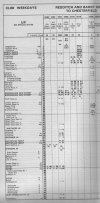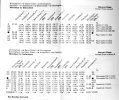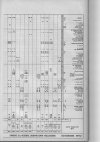Continuing my look at the 1982 BR timetable on Timetable World (https://timetableworld.com/ttw-viewer.php?token=132730db-8ad2-4152-9459-9d410b64c1ea) and one surprising feature is the closure of Redditch station to services outside of peak hours (see table 55).
Was this a permanent timetable or some sort of temporary engineering works amendment? There are literally only a couple of morning and evening peak services plus one Saturday midday service. Everything else terminates at Longbridge.
I'm sure by around 1984 there was an hourly service, as it was around then I first noticed the Cross City timetable. Wikipedia (admittedly may be wrong) suggests an hourly service from 1980.
Extraordinary to have such a poor service if so, I've only visited Redditch about once, but much of the housing looks like it was built before 1982. Certainly swings and roundabouts with the 1982 timetable; XC was of course much more operationally interesting (and probably not much less frequent!) compared to now, and peak increases were much healthier - but some places were decidedly poorly served.
By contrast, the frequency out to Longbridge at the height of the peak was better, AFAIK, than anything achieved in recent times, at every 7 to 8 minutes between 1705 and 1748.
Was this a permanent timetable or some sort of temporary engineering works amendment? There are literally only a couple of morning and evening peak services plus one Saturday midday service. Everything else terminates at Longbridge.
I'm sure by around 1984 there was an hourly service, as it was around then I first noticed the Cross City timetable. Wikipedia (admittedly may be wrong) suggests an hourly service from 1980.
Extraordinary to have such a poor service if so, I've only visited Redditch about once, but much of the housing looks like it was built before 1982. Certainly swings and roundabouts with the 1982 timetable; XC was of course much more operationally interesting (and probably not much less frequent!) compared to now, and peak increases were much healthier - but some places were decidedly poorly served.
By contrast, the frequency out to Longbridge at the height of the peak was better, AFAIK, than anything achieved in recent times, at every 7 to 8 minutes between 1705 and 1748.
Last edited:



